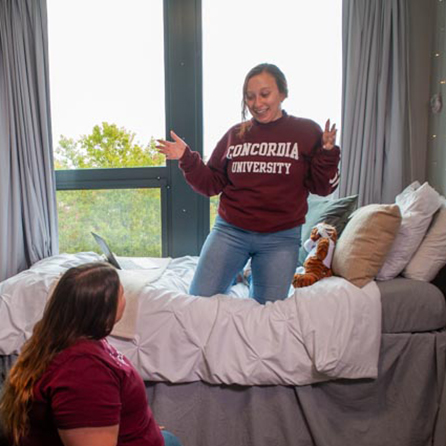For many students, college is their first time living away from family. It’s a big step, but it’s worth it—a college roommate can become a lifelong bestie. Living together, you’ll bond over shared highs and lows, whether you knew each other beforehand or were randomly paired. Occasionally, disagreements arise, giving you an opportunity to learn the life skill of working through issues respectfully. Here are some effective ways to have a great roommate experience:
- Address Problems Early: Don’t let issues build up. Small annoyances can compound and lead to resentment if ignored. Tactfully bring up concerns as soon as they arise.
- Practice Active Listening: Make sure each person feels heard. Listen without interrupting and paraphrase your roommate’s points back to them to show understanding.
 Use “I” Statements: Instead of saying, “You always leave dirty dishes in the sink,” say, “I feel stressed when the dishes pile up.” This approach reduces blame and helps others understand your point of view.
Use “I” Statements: Instead of saying, “You always leave dirty dishes in the sink,” say, “I feel stressed when the dishes pile up.” This approach reduces blame and helps others understand your point of view.- Establish Boundaries and Compromises: When one person values quiet time while the other enjoys having friends over, discuss compromises like designated quiet hours or agreed-upon visiting times.
- Create a Cleaning Schedule: Different people have different approaches to cleanliness. A schedule or checklist can clarify expectations and keep everyone accountable.
- Take a Break: If emotions run high, it can help to step back and revisit the conversation when everyone has had more time to assess the situation. After taking a break, you can come back with a fresh perspective.
- Agree on Communication Methods: Alyse Gowgiel, residence director at CUC, says, “My best advice is for roommates to talk face-to-face … Avoid texting each other about issues or leaving notes in the living space, because this commonly results in misunderstandings or misinterpretations of tone.” If you find it difficult to bring up topics spontaneously, you can set a time each week for a quick roommate meeting.
- Seek Mediation if Necessary: If you can’t resolve an issue on your own, consider involving a third party, like a resident advisor (RA) or mutual friend, to help facilitate a solution. The Counseling Center is a free resource available to all students throughout their time at Concordia-Chicago. Check out their website to find mental health resources and emergency/crisis information. You can also email Counseling.Services@CUChicago.edu with any questions, concerns or requests for support.
Bonus tip: If you find that you are really good at mediating between friends, why not make it official? “If any students reading this have experience or interest in conflict resolution, I would encourage them to apply to be an RA in the spring,” says Gowgiel. “Even if they are commuters!”